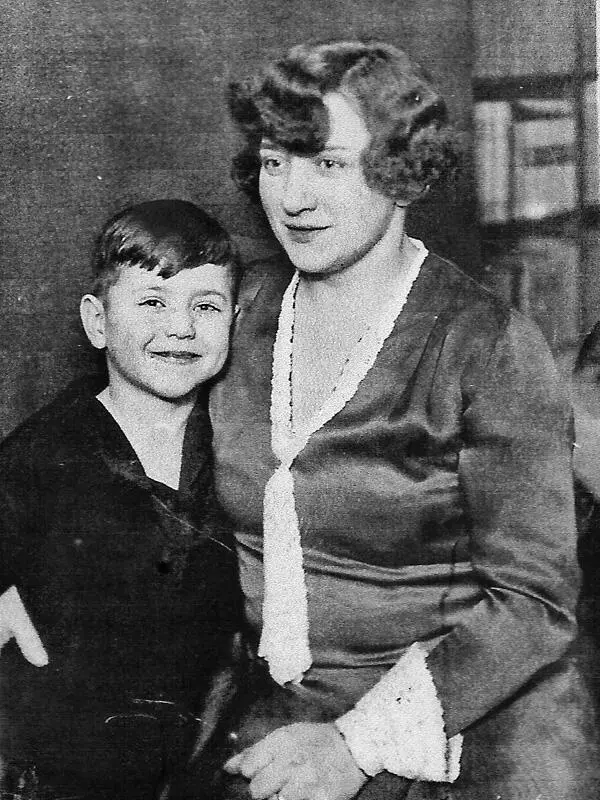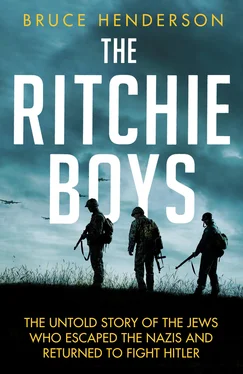1 ...7 8 9 11 12 13 ...24 A deluge of paperwork followed: five copies of his visa application; two copies of his birth certificate; a certificate of good conduct from German authorities (which became increasingly difficult for Jews to acquire from Nazi officials and was eventually eliminated from U.S. immigration requirements); proof of good health from a physician; and signed documents from HIAS as well as from Paula’s sister, Minna, and her husband, Morris Rosenbusch, who had left Germany in 1936 and were living on Chicago’s South Side. They had agreed to take Manfred, who knew little English, into their home.
In June 1938, Manfred’s U.S. visa came through, and an early-July departure date was set. He was to take a train to Hamburg, a major port city in northern Germany, which connected to the North Sea by the Elbe River. An HIAS escort would meet him there, and he would join other German Jewish children aboard an ocean liner for the trip across the Atlantic to America.
As part of an agonizing round of farewells, Manfred bicycled fifteen miles to visit his grandmother’s brother. Manfred had an idea this would be the last time they would see each other, and his elderly granduncle seemed to share his feelings. As they said good-bye, the old man reached into his pocket and took out a crinkled U.S. ten-dollar bill that he carefully smoothed out and handed to the boy. “To help you start a new life in America,” he said.
Paula had been warned that Manfred could bring very little cash with him, so she sewed the bill into the cuff of a pair of his pants. Other Jewish families who had sent loved ones abroad gave her another idea. She purchased two seventy-five-dollar Leica camera lenses and placed each one at the bottom of a talcum-powder can, covering the valuable lenses with talcum. She tucked the cans under some folded linens in Manfred’s steamer trunk, which was sent ahead to the ship in Hamburg. She advised her son to sell the lenses in America when he needed money.
Early on the morning of his departure, Manfred said good-bye to his sister and brother and the other relatives who had come to see him off. It was particularly hard leaving his little brother, Herbert, who idolized Manfred in the way younger brothers are inclined to do. They even looked alike; Herbert, although a head shorter, had the same open, pleasant countenance as Manfred.
Herbert always followed his big brother around like a shadow, wanting whatever Manfred had or did; “ich auch” (me too) was a common refrain. As a junior partner in work and play, Herbert was always happy to help with the chores and anything else to get his big brother’s attention and please him.
Manfred held his grandmother’s long, tight hug, understanding that it was likely to be their last. Then he was off, still feeling her teary kisses on his cheeks as he looked back to see her sadly waving good-bye with both hands.
He and his mother bicycled to the rail station in Halsdorf, where they boarded a train for the ten-mile trip to Kirchhain. Once there, Paula bought her eldest son a one-way ticket on the express train to Hamburg. She handed him a folded white handkerchief and ran through some final instructions: keep the handkerchief in his pocket until arriving in Hamburg, then take it out and hold it in his left hand. He would see a lady on the platform with a white handkerchief in her left hand. She would be his escort, and she would take him to where the other children were gathering to board the vessel.
When his mother had no more instructions, she began to cry. She kissed Manfred and hugged him tightly. She had told him that she was very happy and relieved he was getting out of Germany, and that he would soon be safe in America. But even at fourteen, Manfred understood that what his mother was doing was a cruel opposite to her most basic instincts and to the nature and desire of every Jewish mother he knew: to love, protect, and care for her children.
“Auf Wiedersehen, Mutti,” he said, bidding farewell with more brightness than he felt. After so many heart-wrenching good-byes, this was the one he dreaded the most. He did not want to reveal to her his worst fear, which had been gnawing at him ever since he learned of his upcoming move to America.
Her last words to him, “Be quiet and do not draw attention to yourself,” would stay with him throughout his rail and sea journeys. Stepping into the train compartment, he found a window seat. He and his mother waved to each other as the train pulled out of the station. He could see that she was sobbing now, standing there alone on the platform. His train gained speed, and his mother grew smaller and smaller, until he could no longer make out her figure.
Manfred Steinfeld was deathly afraid he would never see her again.
For Paula Steinfeld, sending her oldest son away, alone, across an ocean to a foreign land to live with others, had been an agonizing decision. Now she prayed this move would save his life and ensure his future, even if she never saw his sweet face again. With a heavy heart, she returned home to Josbach and began to plot how to save her other two children.
Stephan Lewy was seven years old in 1932, when his father, Arthur, a widower for the past year, left him at the Baruch Auerbach Orphanage for Jewish Girls and Boys in Berlin. Stephan’s mother, Gertrude, had been an invalid for several years, and for a time after her death, Arthur had been able to care for his son with the help of a woman he hired to run the household.
The boy missed his mother terribly. She had been a soft and gentle presence in his life. When he did something well, it was his mother who hugged, kissed, and praised him, while his father slapped or spanked him for his transgressions. One of Stephan’s earliest memories was of his mother saying the blessing over the Shabbat candles on Friday night before the special meal she had prepared. But he had many more memories of her bedridden, due to a weak heart. They both enjoyed her reading to him as he snuggled up next to her, and Stephan liked doing things for his mother that she was unable to do herself.
Three months after Gertrude’s death, her younger brother, Ewald, defaulted on a sizable loan that Arthur, a tobacco merchant with his own shop, had guaranteed, against his wife’s advice. In satisfying the debt, Arthur lost the family’s savings and even their household furniture, which Stephan watched being taken away by movers from his perch on a windowsill.
Arthur could no longer afford the hired woman to care for Stephan while he was at work, and none of Gertrude’s relatives were willing or able to help with the little boy. Arthur’s parents and seven siblings were all dead by 1902, wiped out by some contagion, leaving him the only surviving member of the family at the age of nine. A Jewish organization had brought a frightened Arthur to the Auerbach Orphanage, where he remained until he was eligible to leave at age sixteen. Drafted into the German army in 1914, Arthur saw combat on the western front, including the second Battle of Ypres in Belgium, in which the Germans used mass poison gas attacks for the first time in history, killing thousands.

Stephan Lewy with his mother, Gertrude, shortly before her death in 1931. (Family photograph)
After he was discharged following the armistice, Arthur was invited by an army buddy to a dinner party. There, he sat next to a charming young woman dressed in pale gray chiffon; as Arthur would later tell friends, he fell in love with Gertrude between the soup and the apple strudel. They were married several months later.
While still in her twenties, Gertrude endured a near-fatal bout of rheumatic fever that left her heart damaged. A doctor warned her that the rigors of childbirth would endanger her life, and Gertrude and Arthur agreed not to have children. But within a year she was pregnant. The doctor repeated his dire assessment and offered to terminate the pregnancy.
Читать дальше













